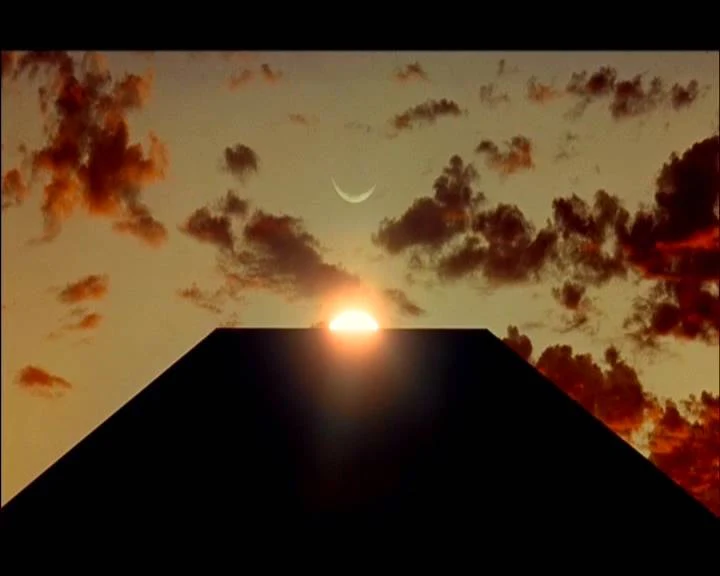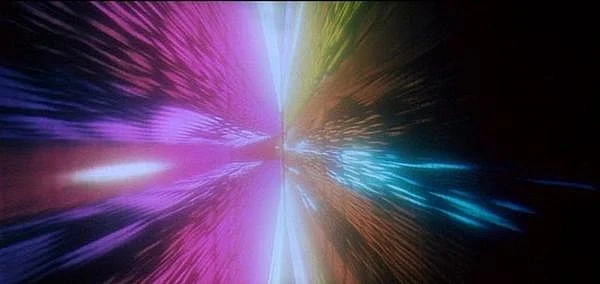
Everyone with even a passing interest in movies tries to pepper in a classic "film" now an then, in between Star Wars’s and Indiana Jones’s. 2001 is a high profile "film," or should I say "fiiiiiiillllllmmmm," with your nose turned up and the "l" rolling down your chin like thick, judgmental honey. So you know, naturally everyone wants to see what the fuss is all about. The celebrated ‘space ballet.’ The infamous banter between Dave and the disturbingly monotonal HAL9000. Images from Kubrick’s opus are omnipresent in popular culture, though many haven’t seen the movie itself. Those who do sit down to watch it are often sort of shocked or offended afterward. The movie’s plot is glacially paced at best, non-existent at worst. Though there are thematic and plot-based through lines, there are no central characters to follow. Even the astronaut Dave – the closest thing 2001 has to a protagonist – is in less than half the movie. Long passages go by without words or plot. If everything you’ve seen before is popcorn fare, it’s not surprising that you might end up confused, bored, or even angered by this movie.
Saying that 2001: A Space Odyssey is a masterwork in front of a bunch of hardcore movie fans is not going to ruffle too many feathers. But for many moviegoers at large this movie is an impenetrable bore. I don’t think that it needs to be, though. It really is a great movie, you just have to approach it more like a trip to New York’s Museum of Modern Art than sitting down for Terminator 2. It’s more Nietzsche than Star Wars. We could argue all day about the essence of “true” science fiction, but the fact is your average moviegoer, even your average smart moviegoer, understands science fiction fundamentally as space-based action-adventure. I don’t think this should preclude these non-science fiction nerds from appreciating 2001. It just bears taking some time for discussion.
2001 is a cornucopia of images, of sounds, of both visual and audial tempos and rhythms. It functions more like a symphony than a narrative. If you can get behind that, cool. If not, I think there are still worthwhile reasons to see and even enjoy or appreciate 2001. It all starts with what you want to get out of it.

2001: A Space Odyssey is a movie with a lot on its mind. Many people who haven't seen it (and sadly some who have) think the central conflict involves an evil computer that hijacks a spaceship. That’s just small fries. 2001’s central concern is the evolution of humankind itself. The movie opens with the dawn of man, for goodness sakes. At the dawn of man and in the year 2001 (“the future”) humans come into contact with ominous smooth, black slabs – monoliths – apparently of some alien design, that push the species forward into the next stage of development. At the dawn of man, contact with the monolith leads to the discovery of tools and weapons. In 2001, it leads to an astronaut turning into a giant space baby. You know, future stuff.
Regardless of who sent the monoliths, regardless of what the psychedelic trip and giant space baby at the end mean specifically, I think that if you can get behind the idea that this movie is about profound change in the fundamental structure and paradigms of humanity beyond our wildest dreams, everything else really locks into place. In this context, even the HAL9000 vignette becomes the story of a computer’s growth pangs into early sentience. From a species standpoint, we shouldn’t assume that growth will be comfortable or sensical, and each chapter of this movie bears that out.
With that in mind, there is a wealth of material to chew on during the plodding, plotless yet nevertheless beautiful passages of this movie. Trust me, if you’re weighing the differences and parallels between early primate humans, contemporary humans, and artificial ‘humans,’ or if you’re trying to sift through the competing ideologies of mental superiority in the conflict between HAL and Dave, you’ll need a space ballet or two to have time to digest even a fraction of your thoughts. This movie is a goldmine of topics and concepts that will make your brain burn.

And if you can get behind all that, you’ll also find ‘movie magic’ riches beyond your wildest dreams. I don’t need to rattle on and on about the quintessential breakthroughs in special effects technology this movie represents. All the Star Wars’s in the world would have never existed if not for the technological breakthroughs here. Though it receives less attention, the movie’s sound design is just as innovative. The musical cues, famous as they are, appeal to your brain rather than your emotion, and like all great intellectual appeals in music, the more knowledge you have of these pieces going into the movie, the richer your experience will be. The tensest sequences in the movie feature no music at all. The entire battle of wills between HAL and Dave is scoreless. Instead, tension is manufactured through sound effects. Frank’s death scene outside the spaceship is accompanied only by his unbearably stressed breathing. A ‘white noise’ whir grows and grows, bringing the audience to the edge until HAL finally reveals his nefarious motives. Same goes for HAL’s death, too. As Dave pulls out memory card after memory card from HAL’s brain, the robot reverts further back in his memory banks. He sings Dave the song “Daisy,” which he learned from his programmer. As his functions shut down the pitch lowers and lowers, and the strange tones of HAL’s death knell make the fear palpable.
Earlier, when being interviewed for the BBC, HAL is asked if he is satisfied. He answers that he is working to the utmost of his capacities; what more could a sentient being hope for? That right there is the key that unlocks 2001. What are we here for? Who put us here? Is the universe here for us, or is the whole thing an accident? Those questions don’t matter. What matters is humanity pushing forward and upward, unlocking the staggering potential within us as persons and as a species. What more could a sentient being hope for?

The monoliths are artificial objects that bring about profound change in organic beings. Do you see what Kubrick is doing there? 2001 is a defense of art itself. The monoliths are universe-sized art objects that supercharge the species.
Watch out, I’m about to go all hypertextual on all you bitches.
2001: A Space Odyssey, the movie itself, is a monolith, an artificial object (a movie) intended to bring about profound change in organic beings (us). We need a reminder that infinite potential is within us, and whether our ‘monolith’ is internal or external, our ultimate satisfaction will come from the fullest possible stimulation and engagement of our faculties. In the final shot of 2001, the infamous Space Baby turns slowly and looks the audience square in the face as if to say, “Okay, I’ve changed, now it’s your turn.”
-Ben